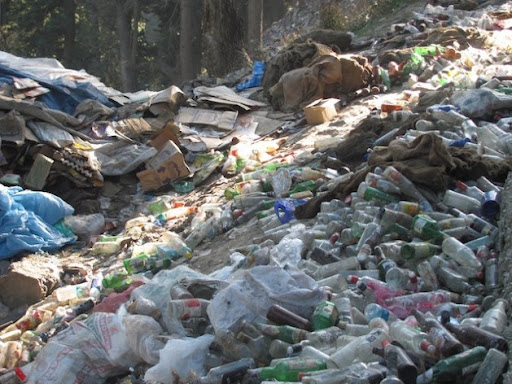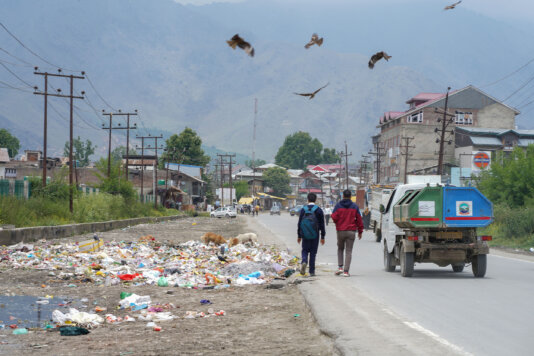Beyond the Beauty: Unveiling the Human Cost of Plastic in Kashmir
By: Javid Amin
Kashmir, often hailed as the “Crown of India” for its breathtaking landscapes, pristine lakes, and vibrant culture, is facing a growing and severe threat – plastic pollution. The valley’s idyllic beauty, which has drawn admirers for centuries, is now being suffocated by a relentless tide of plastic waste, jeopardizing its delicate ecosystem and diminishing its allure. This in-depth exploration delves into the multifaceted issue of plastic pollution in Kashmir, its devastating consequences, and the path toward a cleaner, greener future.
A Valley Drowning in Plastic
The picturesque image of Kashmir is marred by the pervasive presence of plastic debris. From the majestic Dal Lake, now entangled in plastic bags, to the snow-capped mountains littered with discarded bottles, plastic has infiltrated every corner of the valley. This alarming surge is fueled by a confluence of factors:
- Unchecked Consumerism: Rising consumerism and a burgeoning population have led to an increased reliance on single-use plastic packaging for everything from groceries to bottled water.
- Inadequate Waste Management: The existing waste management infrastructure is woefully inadequate, lacking proper segregation systems and efficient recycling facilities. This results in a chaotic disposal system, with plastic often ending up in landfills, rivers, and even pristine forests.
The Invisible Enemy: Microplastics
Beyond the visible plastic waste, a more insidious threat lurks – microplastics. These tiny plastic fragments, shed from synthetic clothing or released from car tire wear, contaminate the environment and enter the food chain through waterways. Their impact is far-reaching, affecting everything from aquatic life to human health.
A Web of Devastation: The Impact of Plastic Pollution
The consequences of plastic pollution in Kashmir are extensive and devastating:
- Ecosystem Disruption: Plastic contamination disrupts delicate ecosystems, harming aquatic life through entanglement and ingestion. The scenic beauty of the valley, a magnet for tourism, is marred by plastic litter, threatening its economic potential.
- Health Hazards: The breakdown of plastic releases harmful chemicals that can leach into the soil and water, posing health risks to humans and animals. Consumption of contaminated food and water can lead to gastrointestinal problems and other health issues.
- Agricultural Woes: Plastic pollution in agricultural fields hinders soil fertility, reduces water retention, and poses a threat to livestock health through ingestion. This translates to decreased crop productivity and economic losses for farmers.
Hope Amidst the Crisis: Charting a Course for Change
The plastic pollution crisis in Kashmir demands immediate and collective action. Here are some key strategies to combat this menace:
- Empowering Communities: Engaging local communities through awareness campaigns, workshops on waste segregation, and promoting composting initiatives are crucial steps. Empowering communities fosters a sense of ownership and responsibility.
- Investing in Infrastructure: Modernizing waste collection and recycling infrastructure is essential. This includes establishing designated waste collection points, advanced recycling plants, and proper training for waste management personnel.
- Policy and Enforcement: Strict enforcement of existing bans on single-use plastics and introducing harsher penalties for violations is necessary. Additionally, promoting biodegradable alternatives and incentivizing responsible waste management practices can drive positive change.
- Educational Efforts: Integrating plastic pollution awareness into school curriculums can cultivate a generation of environmentally conscious citizens. Additionally, encouraging research on biodegradable materials and waste-to-energy solutions are crucial long-term strategies.
A Call to Action: Protecting Paradise
The fight against plastic pollution is a collective responsibility. Here’s what you can do to make a difference:
- Reduce, Reuse, Recycle: Adopt the mantra of Reduce, Reuse, and Recycle in daily life. Carry reusable bags, opt for refillable water bottles, and properly dispose of plastic waste.
- Spread Awareness: Talk to your family, friends, and community about the dangers of plastic pollution. Encourage responsible waste management practices and participate in clean-up drives.
- Support Eco-Initiatives: Advocate for stricter policies and support organizations working toward reducing plastic pollution in Kashmir.
Bottom-Line: Reclaiming Kashmir’s Pristine Beauty By joining hands, we can prevent Kashmir from becoming a “Plastic Paradise.” Let’s reclaim its pristine beauty and ensure a cleaner, healthier future for generations to come. Together, we can turn the tide against plastic pollution and safeguard the “Crown of India” for its rightful place as a haven of natural splendor. The path to preserving Kashmir’s unparalleled beauty lies in our collective action, commitment to sustainability, and unwavering dedication to protecting the environment.



